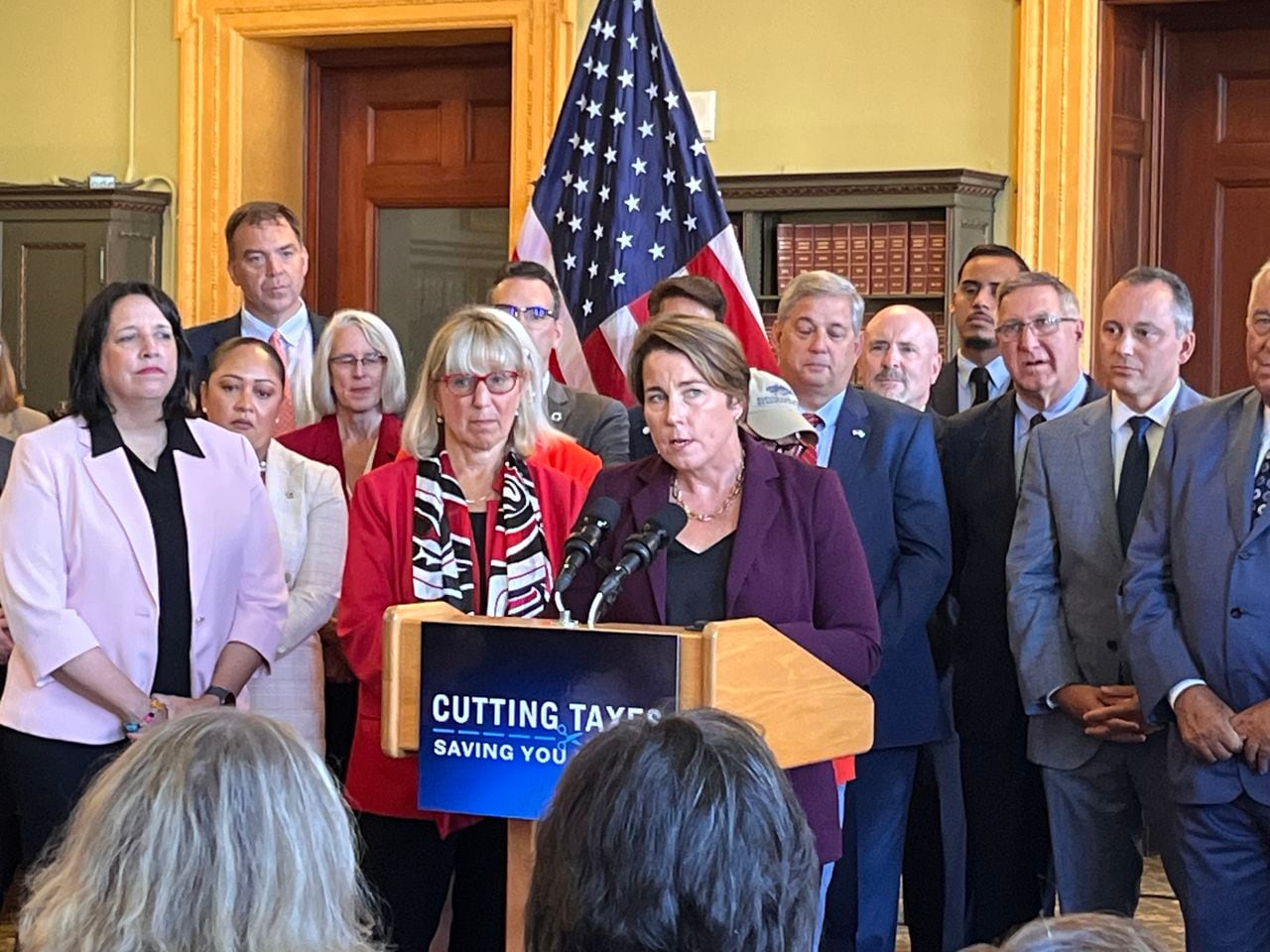From the migrant shelter crisis and the exploding cost and availability of housing to a renewed debate over a gun violence reduction bill and efforts to tackle prescription drug prices, the Massachusetts Legislature faced no shortage of challenges in 2023.
Now, as the majority-Democrat body heads into the second year of its two-year session in January, new challenges, along with some unsolved problems, beckon. It will also be an election year, with state legislators and the commonwealth’s congressional delegation on the ballot, along with a highly consequential race for the White House.
MassLive reached out to legislative leaders on both sides of the State House to ask them about the policy snarls they want to untangle in 2024, as well as the more aspirational proposals that Beacon Hill lawmakers hope to put on Democratic Gov. Maura Healey’s desk in the New Year.
Here’s a look at what they had to say.
In the House
Health care challenges top the list for state House Speaker Ron Mariano, D-3rd Norfolk, who told MassLive in an email that the state’s “entire health care system is still reeling from the effects of the pandemic.”
During an appearance before the state’s Health Policy Commission’s Advisory Council earlier this month, the head of Emerson Hospital told lawmakers that Massachusetts’ healthcare system had reached the “proverbial tipping point,” while a small business leader said there’s “something wrong” with the costs his members face, State House News Service reported.
The evidence is in the numbers: Between 2019 and 2021, total health care expenditures per capita in the Bay State rose by an annualized rate of 3.2 percent. That’s just above the 3.1 percent benchmark that state officials set as their cost-containment goal, according to State House News Service.
The state Senate has started to address those challenges by approving, for the third session in a row, a prescription drug pricing measure, State House News Service reported.
For the first time, the bill also includes a new provision that caps out-of-pocket costs for some medications. The House has yet to take up the bill. And the chamber has not indicated it’s inclined to do so this time out, State House News Service further reported.
In his statement to MassLive, Mariano acknowledged that “hospital emergency departments are still overflowing, providers ranging from primary care offices to entire acute care hospitals are facing closure, bankruptcy or consolidation, and health insurance is becoming increasingly unaffordable for the average Massachusetts family.”
He said the chamber plans to “address these issues in separate, comprehensive legislation in the second year of the session.”
House Minority Leader Bradley H. Jones Jr., R-20th Middlesex, put addressing the state’s looming revenue problems at the top of his 2024 priorities list, followed by aid to cities and towns, and economic development.
Once again, the problems lie in the numbers.
The state collected $2.24 billion in taxes in November, which was 5.5% less than actual collections at the same time last year, and $274 million, or nearly 11%, behind projections, according to recent state Revenue Department data.
Year-to-date collections totaled $14.09 billion, which were $146 million ahead of collections at the same time in 2023, but still $627 million, or 4.3% behind year-to-date estimates.

Massachusetts Gov. Maura Healey takes questions after signing a $1 billion tax relief package into law on Wednesday, Oct. 4, 2023 (MassLive photo by John L. Micek)
Republican lawmakers will “find a way to navigate the increasingly choppy waters of declining state tax revenues in a responsible manner to protect vital state programs and services,” Jones told MassLive in an email.
Earlier this month, Healey rolled out a sweeping economic development plan that calls for a mix of workforce development initiatives, along with investments in such key sectors as the life sciences.
In a year-end interview with MassLive, Healey said she’s looking forward to working with the lawmakers on the legislation backing up those proposals.
“We’re just going to keep building and keep … working every day to meet the moment, and deliver what folks here in the state need,” Healey said, adding that she’s keeping an eye on the volatile revenue picture.
Jones told MassLive that the bill will be top of mind for his caucus, predicting that the House and Senate will “approve a robust economic development package that will help to promote a more business-friendly climate, encourage companies to open and grow in Massachusetts, and create more good-paying jobs to ensure that all residents of the Commonwealth can share in the state’s prosperity.”
In the Senate
On the other side of the State House, Senate President Karen E. Spilka, D-Middlesex/Norfolk, said she wants to “double down on creating policies that make positive changes in our residents’ lives and make our state more affordable, equitable, and competitive.”
That could include free community college for all Massachusetts residents, expanding the state’s existing MassReconnect program, which provides free community college tuition for students aged 25 and older and nursing students of any age. The $20 million program was approved as a part of this year’s state budget, MassLive previously reported.
“This year, we laid the groundwork for free community college,” Spilka told MassLive. “In 2024, we’re going to follow through and work to make it a reality.”
The Senate Democratic leader also underscored the importance of the prescription drug bill the chamber approved earlier this year, arguing that the legislation “will save lives and help people in our state who desperately need lower costs for their medications.”
Rounding out Spilka’s list of resolutions for 2024 is legislative authorization of “an early education and care bill, which will benefit our kids, families, and employers.”
Advocates have called for lawmakers to build on this year’s investments in child care and early childhood education by passing legislation known as the “Common Start” bill.
The bill, which has the backing of majority of state lawmakers, and a coalition of more than 170 advocacy groups, aims to expand financial assistance for families, provide new funding for child care providers, and underwrite better pay and benefits for early educators, WGBH reported.
Speaking to MassLive, Healey also put the legislation on her priority list, saying the state “[needs] to drive down the cost of childcare and education.
“One thing we did this year in the budget is make historic level of a historic level of funding available for childcare, because that is an economic imperative,” Healey told MassLive. “How many people are not working outside of the home right now, because they can’t afford childcare? That’s holding us back. That’s a drag on our economy … So we’re going to need to figure out a way to continue to make those investments.”
Senate Minority Leader Bruce E. Tarr, R-1st Essex/Middlesex, meanwhile, ticked off a multipoint priorities list that included tackling the ongoing shelter crisis, taming healthcare costs, providing aid to school districts dealing with high special education costs, and taking the steps that will allow the state to “lead the way on carbon sequestration.”
In a recent report, the Healey administration said the state could spend as much as $2 billion over the next two years to fund Massachusetts’ emergency shelter system. The administration plans to drain a $700 million state escrow account to cover a portion of the unanticipated expenses, MassLive previously reported.
Among his other priorities, Tarr also listed the “strong health of the state’s stabilization fund,” which could be tapped to help fund the shelter system.
The Republican floor leader also said he wants:
- “Additional relief for household and employer budgets struggling with the high cost of living and doing business in Massachusetts;
- “More support for the men and women who work to provide us with public safety, including workforce recruitment and retention;
- “A plan to ensure that our electric grid can deliver the needed supplies of electricity to meet the demands of the state’s decarbonization goals;
- “Legislative sessions that take place during hours that allow members to be fully engaged and the public to be aware of what is happening,” and
- “The timely appointment of conference committees that actively and transparently meet and engage to resolve differences between the House and Senate.”
State House watchers may take particular delight in Tarr’s goal to continue coming up with “new props, graphics, and other visual aids from the Senate GOP prop shop to illustrate key points” during floor debates in 2024.






